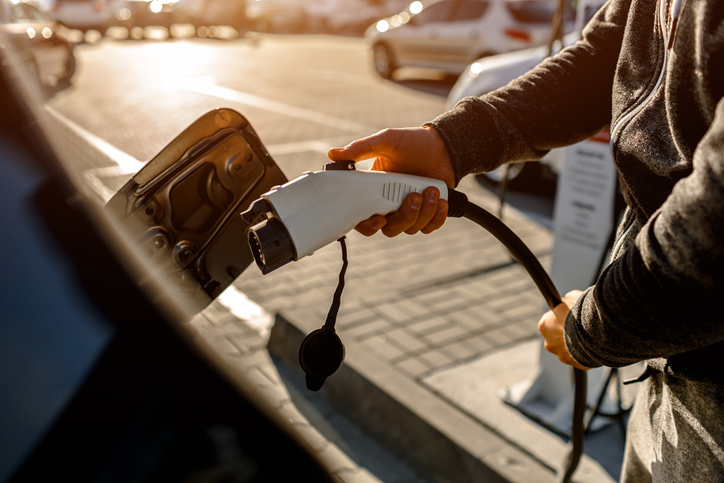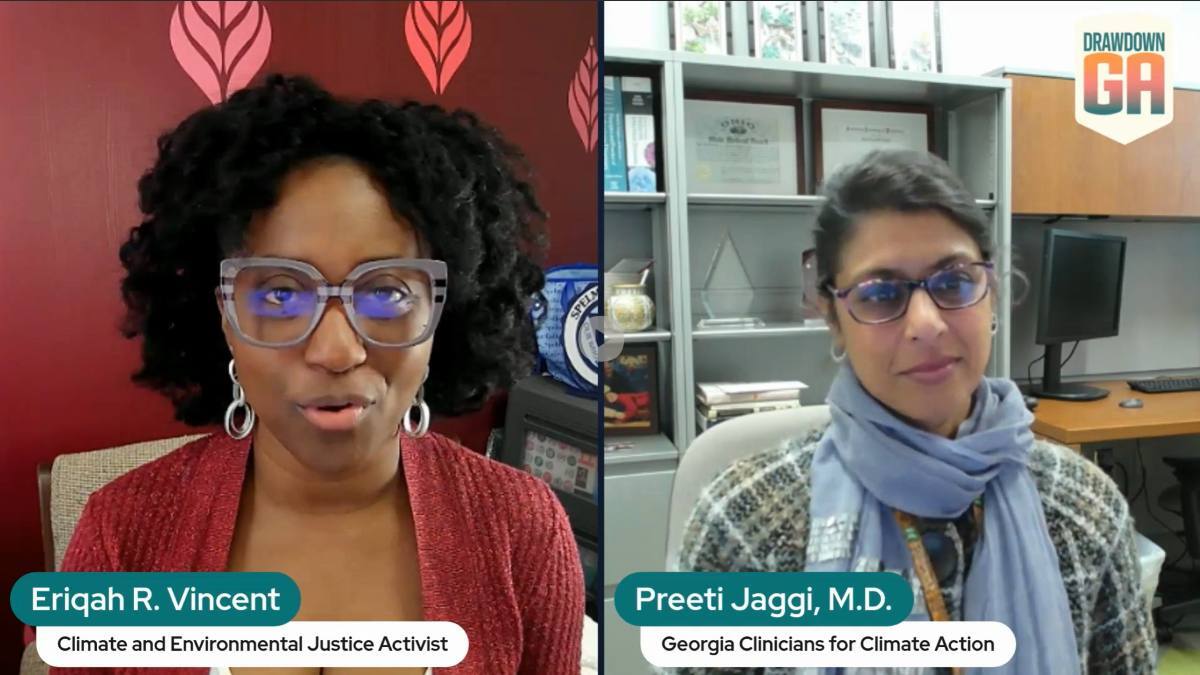Should we focus on solving climate change or growing our economy? In Georgia, we can accomplish both. The shift to electric cars, trucks, and buses is just one example of how scaling climate solutions has a positive impact on emissions and on job creation and other economic issues.
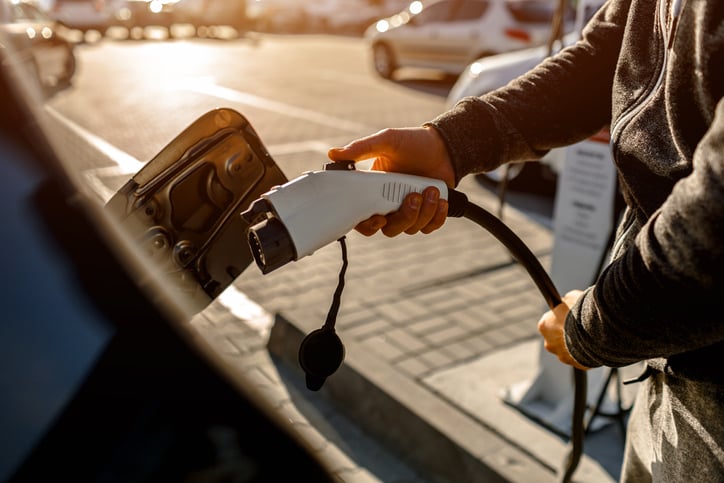
The transportation sector is the largest cause of carbon emissions in Georgia, the Southeast, and nationwide. By electrifying transportation, we can realize immediate and deep cuts in carbon emissions that can be deepened by decarbonizing the electricity grid and increasing access to alternatives to personal vehicle-centric mobility, such as public transportation and infrastructure for bicycles and pedestrians.
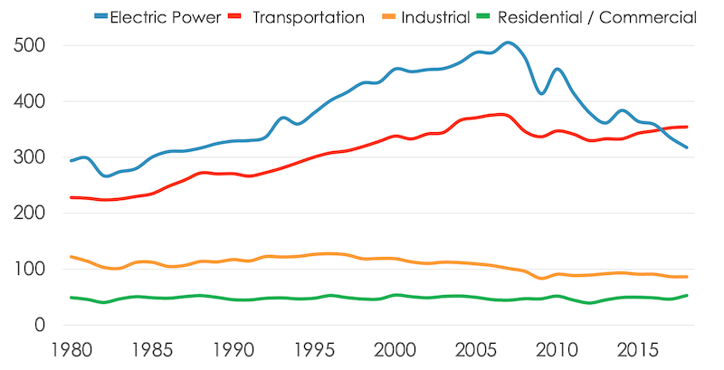
Source: SACE’s third annual "Tracking Decarbonization in the Southeast” report; April 2021, page 5.
Electric cars, trucks, and buses do not have tailpipes and do not produce carbon emissions. It is true that electric vehicles (EVs) are not ‘zero-emission,’ because most electricity powering EVs currently comes from fossil fuels. But even when accounting for the carbon emissions from those fossil fuel-powered plants, driving an EV in Georgia produces approximately 2.5 times fewer carbon emissions than driving a gas vehicle. And importantly, as Georgia’s solar market continues to boom (it currently ranks #9 nationally), and other carbon-free energy solutions are deployed, an EV purchased today will become increasingly cleaner over its lifetime.
Drawdown Georgia has determined that the Peach State could eliminate 1 million metric tons of carbon emissions by replacing 250,000 gas passenger vehicles--that’s less than 4% of vehicles registered in the state--with EVs. There are approximately 6.6 million registered passenger vehicles in Georgia, so if we save 1 million tons of carbon per quarter million, we are looking at a total opportunity of approximately 26 million metric tons of emissions reduction by electrifying them all. That’s equal to reducing the state’s total emissions by over 20%.

Massive Economic Development Opportunity
Electrifying transportation will remake one of the nation’s largest industries--in 2019, the transportation sector accounted for 8.7% of U.S. gross domestic product. Changes in this sector will have compounded effects throughout our economy. Ford, General Motors, Honda, Hyundai, and Volkswagen have all committed to the electrification of 100% new vehicles between 2030 and 2040. These five automakers alone have committed over $800 billion to get it done. Scores of money and jobs are at stake, including in the supply chain, from mineral mining to charging station providers.
Southern Alliance for Clean Energy (SACE) and Atlas Public Policy publish an annual “Transportation Electrification in the Southeast” report tracking the regional EV market across a range of indicators. This year’s report shows remarkable growth across all six indicators.
Southeast EV Indicators through July 2021
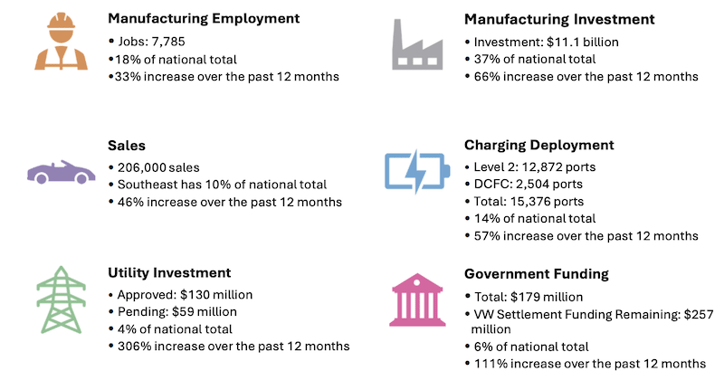 Caption: Source: SACE + Atlas Public Policy, "Transportation Electrification in the Southeast," Southeast Indicators through July 2021
Caption: Source: SACE + Atlas Public Policy, "Transportation Electrification in the Southeast," Southeast Indicators through July 2021
SACE and Atlas Public Policy also produced state-specific data. The latest report shows that Georgia is a regional EV manufacturing and supply chain powerhouse, second only to Tennessee in manufacturing investment and jobs. Georgia also ranks second in our region in EV sales and charging station deployment, trailing only Florida. Strong EV sales and charger deployments point to a growing EV market, which is vital for Georgia to sustain if it hopes to continue to win EV manufacturing and supply chain investments as manufacturers prepare to locate in the regions where their products are selling.
To ensure Georgia maintains its competitive advantage, Governor Kemp created the Electric Mobility Innovation Alliance. The alliance brings together industry stakeholders to identify the policies and investments needed to grow the electric mobility ecosystem and strengthen Georgia’s position in electrification-related manufacturing and innovation.
But the economic opportunities go beyond manufacturing and jobs. Today, Georgia imports 100% of the gas and diesel that fuels transportation. SACE’s “Retained Transportation Fuel Spending in the Southeast” report shows when Georgia consumers fill up at the pump, ⅔ of every dollar spent leaks out of the state’s economy, destined for oil-rich states and nations. If all the cars, trucks, and buses in Georgia were electric today, ⅔ of the money consumers and fleet managers would spend on electricity would stay in the local economy. The result would be a $7.9 billion annual boost to the state’s economy.
And here’s the kicker – the more Georgia’s utilities invest in local renewable energy like solar and battery storage, the bigger the boost. EVs get increasingly cleaner as the electricity grid moves away from coal and fossil gas generation. Electricity generation also becomes more locally sourced, keeping more consumer dollars recirculating in Georgia.
Moving Forward
Though the focus of this blog post is on electrifying transportation in Georgia, it’s important to note that maximum climate and economic benefits result from pairing transportation electrification with efforts to reduce the number of personal vehicles on the road. The best way to achieve this is through investments in mass transit and community walk- and bike-ability, while also increasing renewable electricity generation to reduce the utility sector’s carbon intensity. This ‘reduce, clean, electrify’ strategy engages numerous sectors to multiply economic development, job growth, and carbon reduction opportunities.
Climate science is clear: we must significantly reduce carbon and other greenhouse gas emissions. And all the while, states like Georgia are well-positioned to leverage these climate solutions to spur economic growth, create jobs, and save consumers -- and Georgia as a whole -- a lot of money.


